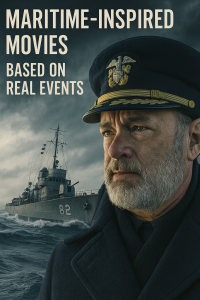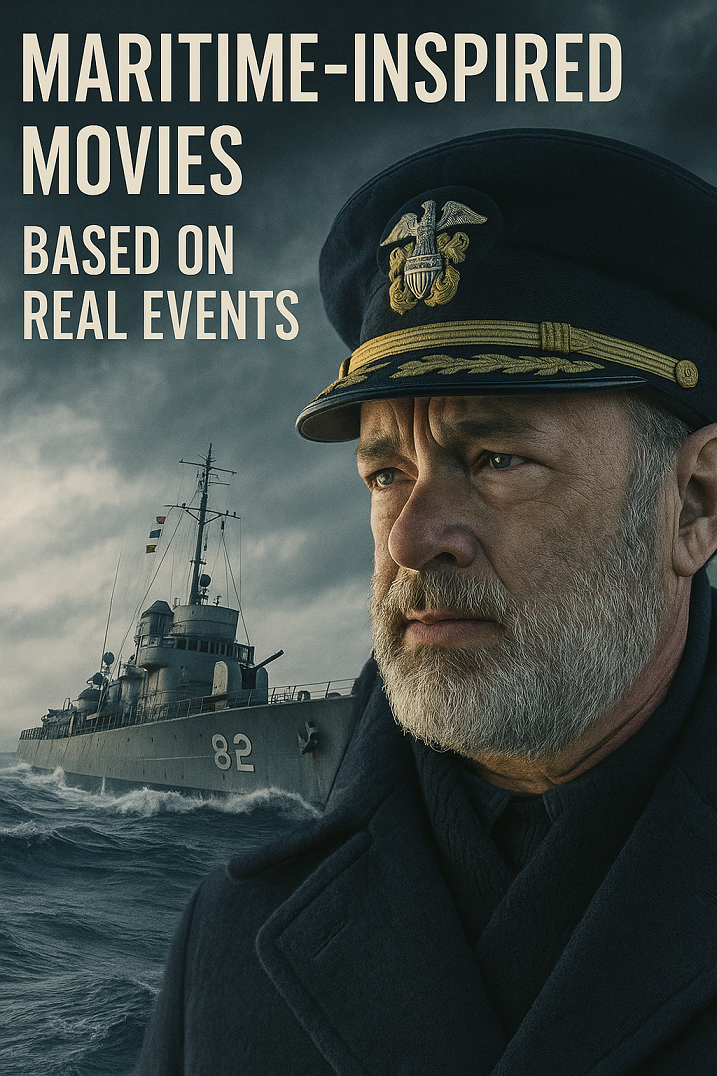 Explore 12 powerful maritime movies based on real events, blending history, heroism, and the sea’s enduring mysteries in this captivating guide.
Explore 12 powerful maritime movies based on real events, blending history, heroism, and the sea’s enduring mysteries in this captivating guide.
The sea has always fascinated humanity — a vast frontier of beauty, danger, and mystery. From heroic rescues to tragic shipwrecks, real-life maritime events have inspired filmmakers to bring powerful stories to the screen. Maritime-inspired movies based on real events do more than entertain; they preserve history, honor seafarers, and capture the challenges of life at sea.
For global audiences — whether maritime professionals, students, or casual film lovers — these films bridge the gap between cinema and maritime reality. They highlight resilience, courage, and the importance of maritime safety and regulations that continue to shape shipping today.
This article explores the top 12 maritime movies inspired by real events, examining their historical context, cinematic storytelling, and relevance to modern seafaring.
Why Maritime Movies Based on Real Events Matter
Maritime-inspired films are not just Hollywood spectacles. They matter because they:
-
Preserve maritime heritage: Films capture true stories of seafarers, making maritime history accessible to a broad audience.
-
Highlight safety lessons: Disasters like shipwrecks or storms remind us of the importance of SOLAS regulations, IMO safety protocols, and continuous training for crews.
-
Inspire future generations: By portraying courage at sea, these stories encourage maritime students and professionals to appreciate the risks and rewards of their industry.
-
Connect global audiences: Movies bring the universal struggles of survival, leadership, and hope at sea to people far from the maritime world.
–
The Top 12 Maritime-Inspired Movies Based on Real Events
Below are 12 unforgettable maritime films, arranged not only by their storytelling power but also by their historical significance and maritime authenticity.
1. Captain Phillips (2013)
Based on the 2009 Maersk Alabama hijacking by Somali pirates, this film portrays Captain Richard Phillips’ ordeal in the Gulf of Aden. Starring Tom Hanks, the movie captures the growing threat of piracy in international shipping lanes.
Maritime Relevance:
The film underscores maritime security challenges and highlights the importance of the ISPS Code and international naval cooperation to safeguard global trade.
2. The Perfect Storm (2000)
Based on Sebastian Junger’s nonfiction book, this film recounts the sinking of the Andrea Gail, a fishing vessel caught in a 1991 storm off the North Atlantic.
Maritime Relevance:
It highlights the dangers of commercial fishing, an industry where safety depends on weather forecasting, modern communication systems, and international fishing regulations.
3. In the Heart of the Sea (2015)
Inspired by the 1820 sinking of the American whaleship Essex — the real-life event that inspired Herman Melville’s Moby-Dick — this film tells a story of survival against overwhelming odds.
Maritime Relevance:
It connects historical whaling practices to modern discussions about sustainable ocean use and the importance of regulating marine resources.
4. The Finest Hours (2016)
This Disney film dramatizes the heroic U.S. Coast Guard rescue of the SS Pendleton crew in 1952, after the tanker split in two during a storm off Cape Cod.
Maritime Relevance:
The story underscores the role of coast guards worldwide and the importance of training, seamanship, and emergency response in maritime operations.
5. Titanic (1997)
James Cameron’s blockbuster is based on the RMS Titanic’s tragic sinking in 1912, one of history’s most famous maritime disasters.
Maritime Relevance:
The disaster led to the creation of the International Convention for the Safety of Life at Sea (SOLAS), the cornerstone of modern maritime safety regulations.
6. Kon-Tiki (2012)
A Norwegian film based on Thor Heyerdahl’s 1947 expedition, where he sailed a balsa wood raft across the Pacific to prove prehistoric sea migration theories.
Maritime Relevance:
The film reflects human ingenuity, navigation skills, and the maritime spirit of exploration — themes central to both ancient and modern seafaring.
7. The Mercy (2017)
This film follows Donald Crowhurst’s ill-fated 1968 Golden Globe yacht race attempt, where he vanished at sea after falsifying his journey records.
Maritime Relevance:
It highlights the psychological toll of solo sailing, the risks of long voyages, and the growing importance of mental health awareness among seafarers.
8. White Squall (1996)
Loosely based on the 1961 sinking of the brigantine Albatross, this movie tells the story of a school-at-sea program where students faced a deadly storm.
Maritime Relevance:
It emphasizes the importance of training young sailors in seamanship, teamwork, and risk management at sea.
9. Deepwater Horizon (2016)
Though centered on an oil rig rather than a ship, this film depicts the 2010 Gulf of Mexico oil spill, one of the worst maritime environmental disasters in history.
Maritime Relevance:
It underscores the environmental impact of offshore operations, the importance of safety culture, and the need for strong MARPOL Convention compliance.
10. Greyhound (2020)
Tom Hanks stars as a U.S. Navy commander escorting Allied convoys across the Atlantic during World War II, inspired by real wartime convoy battles.
Maritime Relevance:
It highlights the strategic importance of convoy protection, naval coordination, and radar technology in ensuring merchant shipping safety during war.
11. Adrift (2018)
Based on Tami Oldham Ashcraft’s memoir, the film tells the true survival story of a couple whose yacht was destroyed by Hurricane Raymond in 1983.
Maritime Relevance:
It illustrates seamanship, resilience, and survival skills essential in yachting and small-vessel navigation.
12. All Is Lost (2013)
Though minimalist, this film portrays a lone sailor (played by Robert Redford) fighting for survival after his yacht collides with a shipping container. While partly fictionalized, it’s rooted in real survival accounts.
Maritime Relevance:
It reminds viewers of the risks posed by floating containers, navigation hazards, and the importance of proper distress signaling equipment under SOLAS.
–
Challenges and Practical Lessons from Maritime Movies
Each film provides profound insights into the real-world challenges faced at sea. For instance, Captain Phillips offers a visceral depiction of modern piracy and ongoing security threats, while The Perfect Storm illustrates the raw, unforgiving power of unpredictable weather and escalating climate risks. The psychological dimension of life at sea is explored in The Mercy, which highlights the critical issues of maritime mental health and extreme isolation. Furthermore, technological failure and the catastrophic potential of human error are central to the narrative of Deepwater Horizon. Finally, films like Adrift and All Is Lost delve into the ultimate test of survival at sea with severely limited resources. For maritime professionals, these dramatizations serve as powerful, narrative-driven reinforcements of the absolute importance of rigorous training, strict compliance with safety protocols, and constant preparedness for any eventuality.
–
Future Outlook & Trends
As the maritime industry evolves, films will continue to capture new challenges:
-
Climate change at sea: Rising storm intensity may inspire future survival dramas.
-
Decarbonization and green shipping: Documentaries and films may soon portray the human side of the industry’s energy transition.
-
Digital navigation and cyber risks: Future thrillers could emerge around cybersecurity threats to autonomous ships.
Cinema will remain a bridge between maritime professionals and the wider public, ensuring seafaring stories continue to inspire.
–
Frequently Asked Questions
1. Which maritime movie is most historically accurate?
The Finest Hours is widely praised for its authenticity in depicting a real U.S. Coast Guard rescue.
2. Why is Titanic still the most famous maritime movie?
Because it combines a true tragedy with cinematic romance, while also spotlighting lessons that shaped SOLAS safety laws.
3. What do these movies teach about maritime safety?
They highlight the importance of regulations like SOLAS, MARPOL, and ISPS, along with crew training and emergency preparedness.
4. Are piracy threats still relevant today?
Yes. While reduced in some regions, piracy remains a concern in the Gulf of Guinea and parts of Southeast Asia.
5. Do these films reflect real seafarer challenges today?
Absolutely. Issues like isolation, storms, and survival remain relevant, though modern ships are better equipped.
6. Can maritime movies be used in training?
Yes, selected films can serve as case studies in maritime education, illustrating human factors, safety culture, and risk management.
–
Conclusion
From the chilling realism of Captain Phillips to the timeless tragedy of Titanic, maritime-inspired movies remind us that the sea is both a giver of life and a relentless force. They celebrate courage, warn against complacency, and underline the importance of maritime safety frameworks.
For maritime professionals and enthusiasts alike, these films are more than entertainment — they are lessons written on water and captured on film.
References
-
International Maritime Organization (IMO) – SOLAS and MARPOL Conventions
-
International Chamber of Shipping (ICS) – Piracy and Security Guidance
-
U.S. Coast Guard Historical Archives – SS Pendleton Rescue
-
United Nations Conference on Trade and Development (UNCTAD) – Maritime Transport Reports
-
Marine Insight – Maritime Movies and Real Events Analysis
-
The Maritime Executive – Safety and Historical Context Articles
-
Lloyd’s List – Shipping Safety and Piracy Reports


Thanks